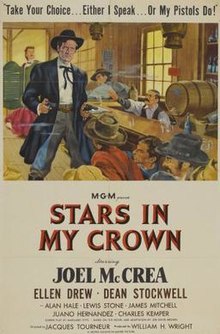“Take your choice—either I speak or my pistols do.” —Josiah Gray
Stars in My Crown is a multi-layered film. First of all, while it’s called a Western, it really isn’t one—there are no stagecoach robberies, rampaging Indians, gunfights or a stalwart prairie woman standing by her man. The setting is the South, for one thing.
Stars in My Crown has more the feel of a precursor of TV’s The Waltons, with its emphasis on family, personal relations and homespun philosophies. Yes, clearly intended as a family picture, by its very nature, what might be called the “soft touch,” it borders on being a sentimental tearjerker, a simplistic painting of those long-gone “good old days,” even a pious exercise in religiosity, as the main character is a preacher.
Because the story is narrated (voice of Marshall Thompson) by a young boy about life in a small Southern town, and because one of the subplots touches on racial prejudice, the film, however timidly and unintentionally, anticipates To Kill a Mockingbird (1962). The film’s climax produces a memorable line as a resourceful parson tricks hooded Ku Klux Klaners into freeing an innocent black man.
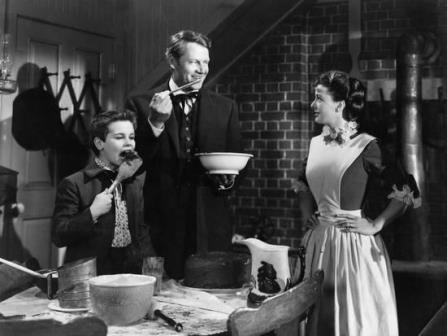 That the black man’s survival contradicts the less happy fate of Tom Robinson in Mockingbird reveals that much has changed in American life in the brief twelve years between the two films or, rather, that that idealized “soft touch” is no longer valid, not that it ever was.
That the black man’s survival contradicts the less happy fate of Tom Robinson in Mockingbird reveals that much has changed in American life in the brief twelve years between the two films or, rather, that that idealized “soft touch” is no longer valid, not that it ever was.
Jacques Tourneur, who made a special effort to direct Crown because it appealed to him, narrowly avoids the possible sanctimonious preaching and overt sentimentality of the subject matter. His tight control keeps things moving at a fair clip, considering the material is slow-moving by its very nature. Still, the film is dated to a certain extent, and its religious simplicities may not be to everyone’s taste.
Further, the presence of one of the “nice guys” of the movie business, Joel McCrea, predisposes an audience to expect a movie of equal niceness. Something of a cowboy from an early age, McCrea had always wanted to make Westerns, urging studios and directors to put him on a horse. Finally lucky in the ’40s, prior to Stars in My Crown he appeared in six Westerns in a row and many thereafter, challenging his two most popular cowboy-actor contemporaries, Randolph Scott and James Stewart.
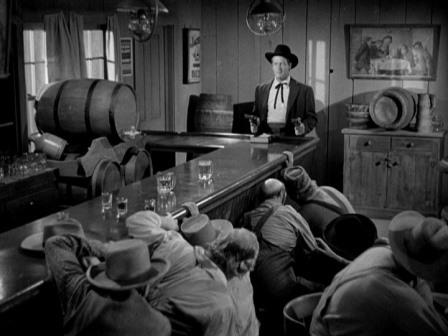 When parson Josiah Gray (McCrea) arrives in Walesburg, he proves far from the ordinary country clergyman. “I’m the new preacher in town,” he says, walking up to a bar. “I am to give my first sermon here and now.” The drinkers laugh and Josiah draws two pistols, simply laying them on the bar. “Thanks,” he says to those crouching behind the bar.
When parson Josiah Gray (McCrea) arrives in Walesburg, he proves far from the ordinary country clergyman. “I’m the new preacher in town,” he says, walking up to a bar. “I am to give my first sermon here and now.” The drinkers laugh and Josiah draws two pistols, simply laying them on the bar. “Thanks,” he says to those crouching behind the bar.
Josiah leads the effort to build the town’s first church, falls in love and marries Harriet (Ellen Drew) and the two adopt Josiah’s orphaned nephew, John (Dean Stockwell).
Among events in the life of the town, Josiah defends a hapless citizen (Arthur Hunnicutt) from the local bully (Jack Lambert), a procrastinating churchgoer, Jed Isbell (Alan Hale in his last film), will suffer a Josiah sermon “Just as soon as you get God to plow that bottom land for me!” and a medicine man/magician (Charles Kemper) entertains adults and kids alike.
Most important, Josiah must resolve the two key subplots. First, he resents that a new doctor, Daniel Harris (James Mitchell), is leery of religion. Harris believes Josiah is helping spread the current typhoid epidemic by disregarding his advice about quarantining the citizenry. When the woman (Amanda Blake) he wants to marry falls ill from the disease and the parson saves her through prayer, Harris apologies.
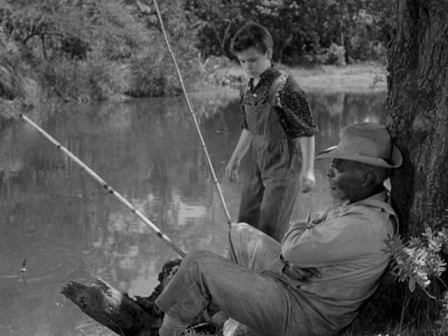 Then there is Josiah’s defense of a poor black sharecropper, Uncle Famous Prill (Juano Hernandez), who won’t sell his mica-rich land to greedy store owner Lon Backett (Ed Begley). When Backett’s white-sheeted KKK men threaten to lynch Prill, Josiah insists on first reading Prill’s will from two sheets of paper he removes from his coat pocket.
Then there is Josiah’s defense of a poor black sharecropper, Uncle Famous Prill (Juano Hernandez), who won’t sell his mica-rich land to greedy store owner Lon Backett (Ed Begley). When Backett’s white-sheeted KKK men threaten to lynch Prill, Josiah insists on first reading Prill’s will from two sheets of paper he removes from his coat pocket.
What he reads highlights the generosity and kindness of Prill, who, it seems, has left his horse to this person, his rifle to another and so on. Knowing everyone in town, he makes the men under their sheets the beneficiaries. The Klansmen drop their rope, abandon their torches and walk away, ashamed. When the parson tosses aside the pages, John discovers they are blank. “This ain’t a will,” he says. “Yes, it is, son,” Josiah replies. “It’s the will of God.”
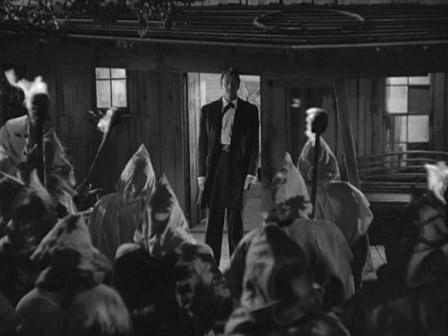 In the final scene, everyone gathers at the church, the good, the bad and the ugly, regardless of previous dispositions and affiliations. The congregation sings the title song, “Will There Be Any Stars (in My Crown)?” His land plowed or not, even Jed Isbell is there.
In the final scene, everyone gathers at the church, the good, the bad and the ugly, regardless of previous dispositions and affiliations. The congregation sings the title song, “Will There Be Any Stars (in My Crown)?” His land plowed or not, even Jed Isbell is there.
All ends well in this sentiment, idealized world. Fantasy it might be, but a well-done movie that can be enjoyed on its own terms, in the context of its time.
A special touch added to Stars in My Crown, one not always recognized, perhaps even noticed so well does it mirror the screen, is the score by Adolph Deutsch, London-born despite his name. Better known for his comedy scores (Some Like It Hot, 1959, and The Apartment, 1960) and film noirs (They Drive by Night, 1940, and The Maltese Falcon, 1941), the music here is strikingly atypical of his style.
Added to the abundant source music of frequent hymn-singing, the score is a pastiche of homespun Americanareminiscent of Aaron Copland in Our Town (1940) and The Red Pony (1949), or Hugo Friedhofer in The Best Years of Our Lives (1946).
[embedyt] https://www.youtube.com/watch?v=mSzRdMn8Sb4[/embedyt]
